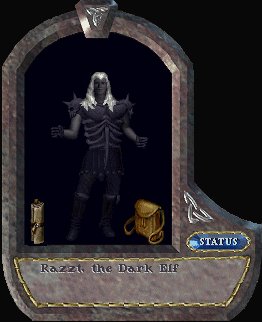
Thiel Kilidiri
We will now focus on “(…) the green land of the golden people (…)”, as the Bard once described it. Careliniador of the silver voice lived close to two thousand years ago, yet his work remains the prime reference on the history of the Elven people. It is in the nature of this people that in matters of society, habits and view of the world the Bard’s words still describe them without a comma of deviation.
Elves change slowly and with great reluctance. This is the one and single most important factor one must take into account when studying the history of the Land of Lorennor and its people.
Almost as important is their love of their land and their proven ability to live and prosper with it, not against it. Surpassing woodcrafters, their art with the products and creatures of nature is unequalled. Due to a happy quirk of nature there were also deposits of good stone and metal within their borders, which they used as naturally and as expertly as they collect the wild berries found in their tall forests.
For the historian, they are a factor of stability and reference through time. The recorded history of the Elven peoples reaches a long way into the past, as do their memories. The best way I can describe it is that it is inhuman in its precision.
Not that this means much, knowing how easy it is for humans to forget
things.
The Elven race is divided in twain, forming the people of the Elves and the people of the Silfie. There is a slight difference in colour, but let not such details trouble you. As one who knows, I assure you that they share the same flesh (…)
About the origins of the Elves, we know that their first King unified the various tribes of elfin hunter-gatherers in the year 8533 before the Age of Light and that he chose the location of his seat of power in the year 8489. The foundation of Legathien marks the year 1 of their calendar, and to this day it has remained the capital of Lorennor. It is very significant that their first kings were of the Silfie tribe.
From its very start, Lorennor has been a closed land. The people itself are the main factor that contributes to this. These long-lived citizens of a haughty civilization, which reckons time by generations rather than seasons, look down on all other races. They consider them to be fickle, chaotic and most unreliable.
I must correct myself here, of course. They hardly look down on my own kind (…)